仁爱科普版(2024)七年级英语下册 Unit 11 Rules Matter! Project & Review 课件 (共26张PPT)
文档属性
| 名称 | 仁爱科普版(2024)七年级英语下册 Unit 11 Rules Matter! Project & Review 课件 (共26张PPT) | 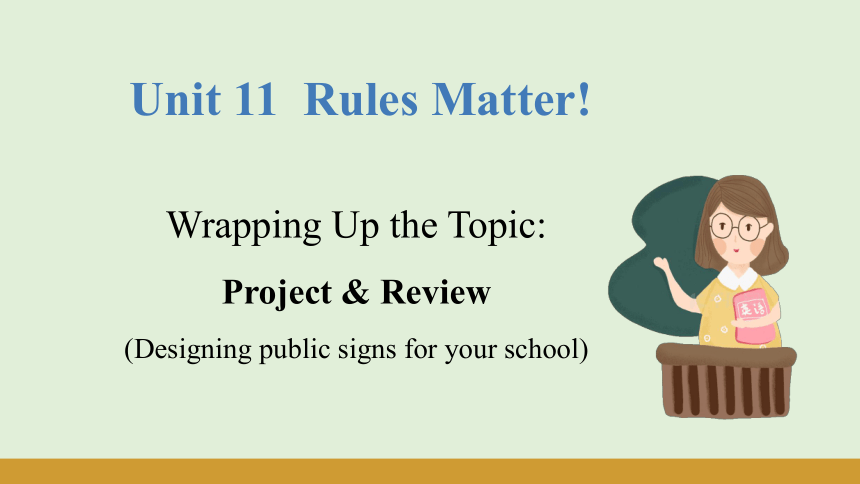 | |
| 格式 | pptx | ||
| 文件大小 | 41.5MB | ||
| 资源类型 | 教案 | ||
| 版本资源 | 仁爱科普版 | ||
| 科目 | 英语 | ||
| 更新时间 | 2025-04-03 19:42:18 | ||
图片预览

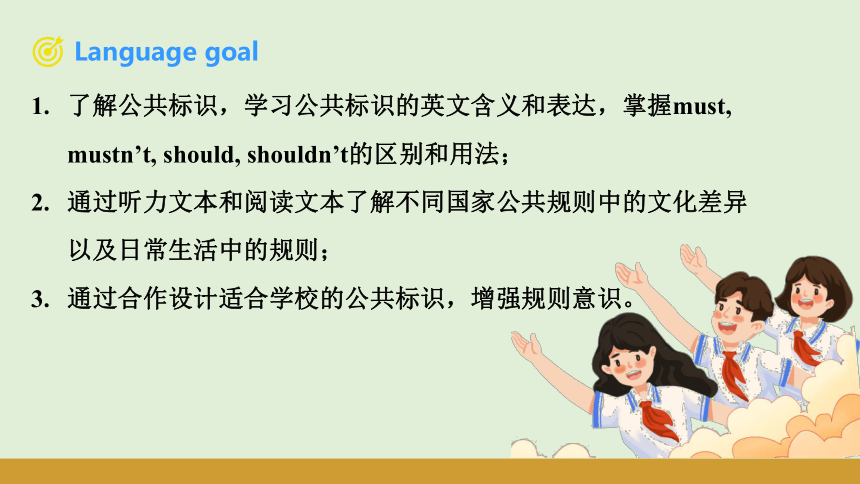
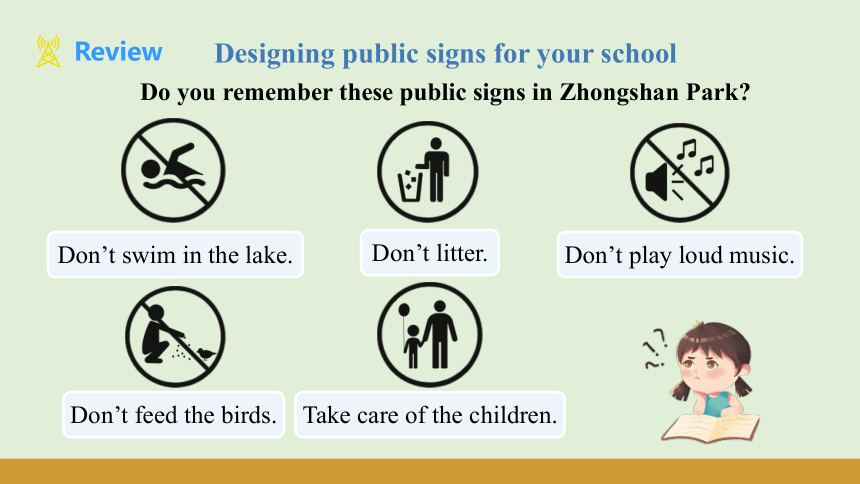
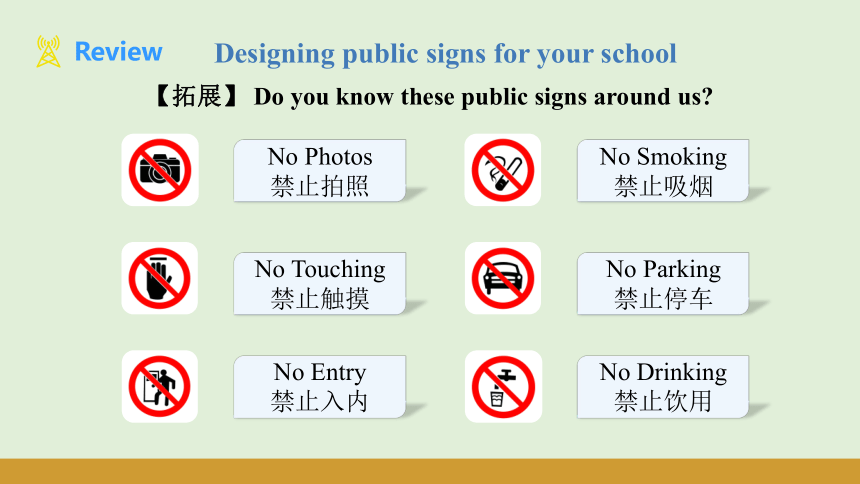

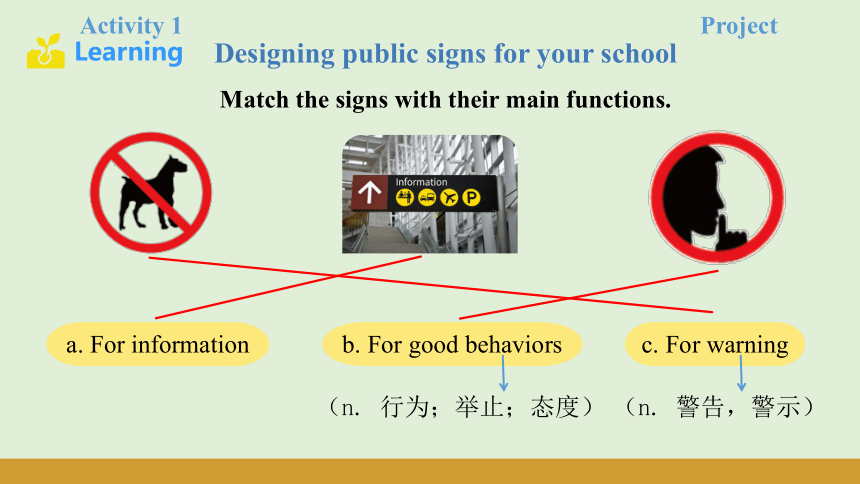
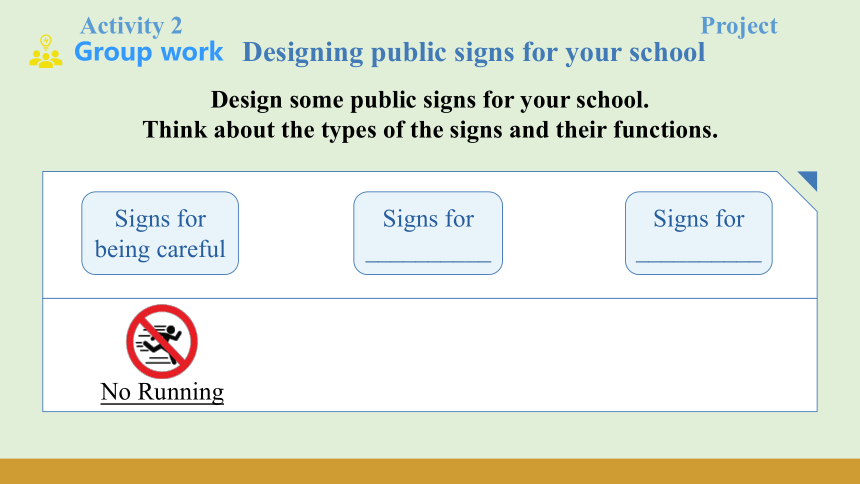
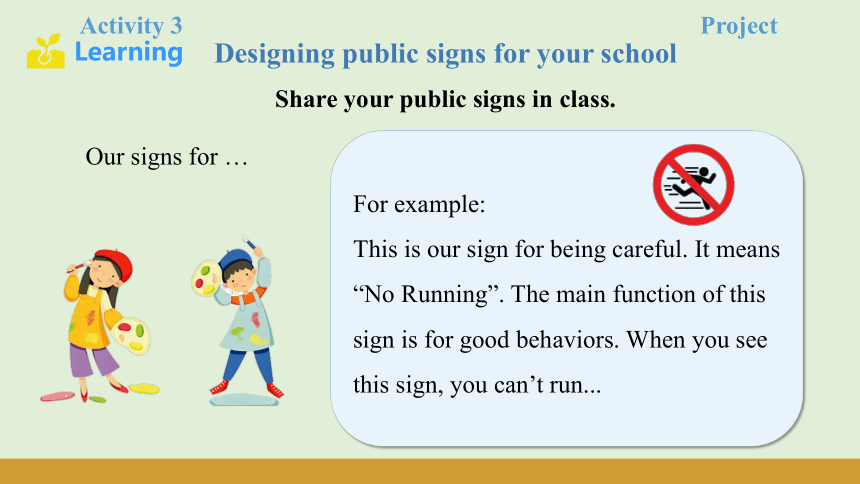
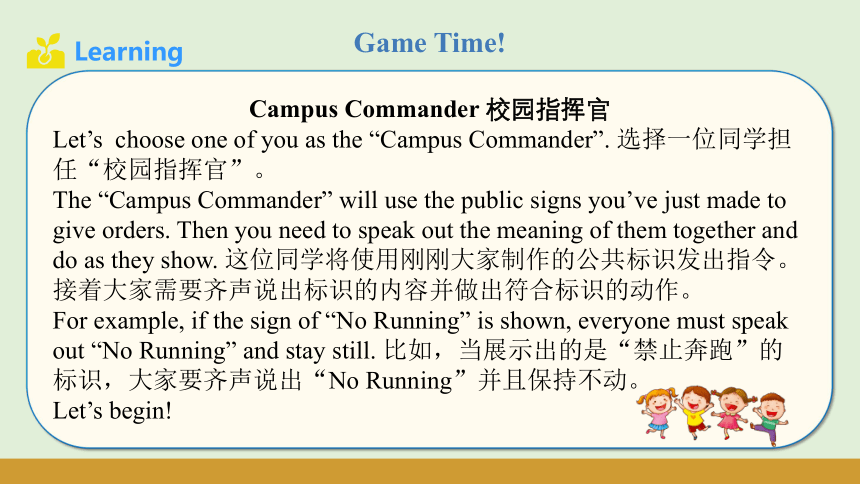
文档简介
(共26张PPT)
Unit 11 Rules Matter!
Wrapping Up the Topic:
Project & Review
(Designing public signs for your school)
了解公共标识,学习公共标识的英文含义和表达,掌握must, mustn’t, should, shouldn’t的区别和用法;
通过听力文本和阅读文本了解不同国家公共规则中的文化差异以及日常生活中的规则;
通过合作设计适合学校的公共标识,增强规则意识。
Don’t swim in the lake.
Don’t litter.
Don’t play loud music.
Don’t feed the birds.
Take care of the children.
Designing public signs for your school
Do you remember these public signs in Zhongshan Park
No Photos
禁止拍照
No Touching
禁止触摸
No Entry
禁止入内
No Smoking
禁止吸烟
No Parking
禁止停车
No Drinking
禁止饮用
Designing public signs for your school
【拓展】 Do you know these public signs around us
Activity 1
Project
Look at the public signs and answer the questions.
1. What do the following public signs mean Where can you find them
2. Why do we need public signs in our life
Designing public signs for your school
Activity 1
Project
Match the signs with their main functions.
a. For information
b. For good behaviors
c. For warning
(n. 行为;举止;态度)
(n. 警告,警示)
Designing public signs for your school
Activity 2
Project
Designing public signs for your school
Design some public signs for your school.
Think about the types of the signs and their functions.
Signs for being careful
Signs for __________
Signs for __________
No Running
Activity 3
Project
Share your public signs in class.
Designing public signs for your school
Our signs for …
For example:
This is our sign for being careful. It means “No Running”. The main function of this sign is for good behaviors. When you see this sign, you can’t run...
Game Time!
Campus Commander 校园指挥官
Let’s choose one of you as the “Campus Commander”. 选择一位同学担任“校园指挥官”。
The “Campus Commander” will use the public signs you’ve just made to give orders. Then you need to speak out the meaning of them together and do as they show. 这位同学将使用刚刚大家制作的公共标识发出指令。接着大家需要齐声说出标识的内容并做出符合标识的动作。
For example, if the sign of “No Running” is shown, everyone must speak out “No Running” and stay still. 比如,当展示出的是“禁止奔跑”的标识,大家要齐声说出“No Running”并且保持不动。
Let’s begin!
Activity 1
Review
Listen to the text and complete the table,
and then discuss how the rules are different from those in China.
Britain People drive on the _______.
Singapore If you ___________ on the subway, you will get a fine to 500 Singapore dollars.
_______ Children under _______ must wear helmets while riding bicycles. At night, riders must have _______ in the front and at the back of the bicycle.
Japan Remember not to ride a bicycle after _______.
Countries
Different rules
left
eat or drink
18
Canada
lights
drinking
Activity 2
Review
Fill in the blanks according to the signs.
1. Please __________ in the cinema.
2. You’re driving too fast! You should __________.
3. During the meeting, we mustn’t chat. We should __________
carefully.
be quiet
drive slowly
listen
Activity 2
Review
Fill in the blanks according to the signs.
4. The water is deep. You ____________________ here.
5. You shouldn’t _______ or _______ in the library.
mustn’t swim
eat
drink
Activity 3
Review
Look at the pictures. Put a check (√) for must /should or a cross (×) for mustn’t /shouldn’t , and then make sentences with the given words.
1. (we, be late for, school)
____________________________________________
2. (Jack, eat, classroom)
________________________________________________
We shouldn’t be late for school.
Jack shouldn’t eat in the classroom.
×
×
Activity 3
Review
Look at the pictures. Put a check (√) for must /should or a cross (×) for mustn’t /shouldn’t , and then make sentences with the given words.
3. (I, do homework, every day)
________________________ ________________________
4. (Lingling, keep...clean, her bedroom)
______________________________________________________________
I should/must do homework every day.
Lingling should keep her bedroom clean.
√
√
Activity 3
Review
Look at the pictures. Put a check (√) for must /should or a cross (×) for mustn’t /shouldn’t , and then make sentences with the given words.
5. (my uncle, feed, dog, every day)
______________________________________________________
6. (Mr. Li, stay up, too late)
________________________________________________
My uncle should feed the dog every day.
Mr. Li shouldn’t/mustn’t stay up too late.
√
×
Activity 4
Review
Read the text and complete the reading tasks.
We Chinese think of food as an important part of our lives. Here are some table manners in China.
Taking the Right Seat
There is usually a “Best Seat” for the most important person and a right seat for everyone. So, don’t sit in the wrong seat.
Activity 4
Review
Read the text and complete the reading tasks.
Eating — Important Rules to Learn
Always wait for the elders or others to try the dishes first.
Don’t put too much food on your own plate.
Using Chopsticks
People must not put chopsticks in rice.
Do not make a noise with chopsticks.
Never point at people with chopsticks.
Activity 4
Review
Read the text and complete the reading tasks.
Table manners in China.
The most important person.
Always wait for the elders or others to try the dishes first.
Don’t put too much food on your own plate.
1. Give the text a good title.
2. Who takes the “Best Seat”
3. What are good eating manners
________________________________
_________________________________
____________________________________________________________________
____________________________________________________________________
Activity 4
Review
Read the text and complete the reading tasks.
4. Put a check (√) for good manners and a cross (×) for bad manners.
×
( )
( )
( )
( )
√
×
×
单词 词性 释义
mean v. 表示······的意思
adj. 吝啬的;小气的
behavior n. 行为;举止;态度
warning n. (就可能发生的意外等提出的)警告,警示;先兆
subway n. 地铁
dollar n. 元(美国、加拿大、澳大利亚等国的货币单位)
New words
单词 词性 释义
helmet n. 头盔
rider n. 骑手;骑马(或自行车、摩托车)的人
meeting n. 会议;集会
manner n. 礼仪;礼貌(复数)
seat n. 座位
New words
单词 词性 释义
person n. 人;个人
*wrong adj. 错误的;有毛病
plate n. 盘子;碟子
chopstick n. 筷子
point v. 指,指向
n. 论点;重点;点
New words
1. We __________ be noisy in the library.
2. We __________ follow the information signs at the airport(机场).
3. People __________ drive on the right in China.
根据语境,从must, mustn’t, should, shouldn’t这四项中选择合适的一项填入下方空处。
shouldn’t
should
must
4. We __________ run on the subway.
5. We __________ go to bed early.
6. We __________ use chopsticks to point at others.
根据语境,从must, mustn’t, should, shouldn’t这四项中选择合适的一项填入下方空处。
mustn’t
shouldn’t
should
We learn:
some words: mean, dollar, meeting, manner, seat, person...
something about public signs;
the use of verbs must/mustn’t and should/shouldn’t.
We can:
understand some rules of different public signs;
design public signs for our school.
1. Read the text in Activity 4 in Review lesson. Try to write down more table manners in China.
2. Finish the exercises.
Unit 11 Rules Matter!
Wrapping Up the Topic:
Project & Review
(Designing public signs for your school)
了解公共标识,学习公共标识的英文含义和表达,掌握must, mustn’t, should, shouldn’t的区别和用法;
通过听力文本和阅读文本了解不同国家公共规则中的文化差异以及日常生活中的规则;
通过合作设计适合学校的公共标识,增强规则意识。
Don’t swim in the lake.
Don’t litter.
Don’t play loud music.
Don’t feed the birds.
Take care of the children.
Designing public signs for your school
Do you remember these public signs in Zhongshan Park
No Photos
禁止拍照
No Touching
禁止触摸
No Entry
禁止入内
No Smoking
禁止吸烟
No Parking
禁止停车
No Drinking
禁止饮用
Designing public signs for your school
【拓展】 Do you know these public signs around us
Activity 1
Project
Look at the public signs and answer the questions.
1. What do the following public signs mean Where can you find them
2. Why do we need public signs in our life
Designing public signs for your school
Activity 1
Project
Match the signs with their main functions.
a. For information
b. For good behaviors
c. For warning
(n. 行为;举止;态度)
(n. 警告,警示)
Designing public signs for your school
Activity 2
Project
Designing public signs for your school
Design some public signs for your school.
Think about the types of the signs and their functions.
Signs for being careful
Signs for __________
Signs for __________
No Running
Activity 3
Project
Share your public signs in class.
Designing public signs for your school
Our signs for …
For example:
This is our sign for being careful. It means “No Running”. The main function of this sign is for good behaviors. When you see this sign, you can’t run...
Game Time!
Campus Commander 校园指挥官
Let’s choose one of you as the “Campus Commander”. 选择一位同学担任“校园指挥官”。
The “Campus Commander” will use the public signs you’ve just made to give orders. Then you need to speak out the meaning of them together and do as they show. 这位同学将使用刚刚大家制作的公共标识发出指令。接着大家需要齐声说出标识的内容并做出符合标识的动作。
For example, if the sign of “No Running” is shown, everyone must speak out “No Running” and stay still. 比如,当展示出的是“禁止奔跑”的标识,大家要齐声说出“No Running”并且保持不动。
Let’s begin!
Activity 1
Review
Listen to the text and complete the table,
and then discuss how the rules are different from those in China.
Britain People drive on the _______.
Singapore If you ___________ on the subway, you will get a fine to 500 Singapore dollars.
_______ Children under _______ must wear helmets while riding bicycles. At night, riders must have _______ in the front and at the back of the bicycle.
Japan Remember not to ride a bicycle after _______.
Countries
Different rules
left
eat or drink
18
Canada
lights
drinking
Activity 2
Review
Fill in the blanks according to the signs.
1. Please __________ in the cinema.
2. You’re driving too fast! You should __________.
3. During the meeting, we mustn’t chat. We should __________
carefully.
be quiet
drive slowly
listen
Activity 2
Review
Fill in the blanks according to the signs.
4. The water is deep. You ____________________ here.
5. You shouldn’t _______ or _______ in the library.
mustn’t swim
eat
drink
Activity 3
Review
Look at the pictures. Put a check (√) for must /should or a cross (×) for mustn’t /shouldn’t , and then make sentences with the given words.
1. (we, be late for, school)
____________________________________________
2. (Jack, eat, classroom)
________________________________________________
We shouldn’t be late for school.
Jack shouldn’t eat in the classroom.
×
×
Activity 3
Review
Look at the pictures. Put a check (√) for must /should or a cross (×) for mustn’t /shouldn’t , and then make sentences with the given words.
3. (I, do homework, every day)
________________________ ________________________
4. (Lingling, keep...clean, her bedroom)
______________________________________________________________
I should/must do homework every day.
Lingling should keep her bedroom clean.
√
√
Activity 3
Review
Look at the pictures. Put a check (√) for must /should or a cross (×) for mustn’t /shouldn’t , and then make sentences with the given words.
5. (my uncle, feed, dog, every day)
______________________________________________________
6. (Mr. Li, stay up, too late)
________________________________________________
My uncle should feed the dog every day.
Mr. Li shouldn’t/mustn’t stay up too late.
√
×
Activity 4
Review
Read the text and complete the reading tasks.
We Chinese think of food as an important part of our lives. Here are some table manners in China.
Taking the Right Seat
There is usually a “Best Seat” for the most important person and a right seat for everyone. So, don’t sit in the wrong seat.
Activity 4
Review
Read the text and complete the reading tasks.
Eating — Important Rules to Learn
Always wait for the elders or others to try the dishes first.
Don’t put too much food on your own plate.
Using Chopsticks
People must not put chopsticks in rice.
Do not make a noise with chopsticks.
Never point at people with chopsticks.
Activity 4
Review
Read the text and complete the reading tasks.
Table manners in China.
The most important person.
Always wait for the elders or others to try the dishes first.
Don’t put too much food on your own plate.
1. Give the text a good title.
2. Who takes the “Best Seat”
3. What are good eating manners
________________________________
_________________________________
____________________________________________________________________
____________________________________________________________________
Activity 4
Review
Read the text and complete the reading tasks.
4. Put a check (√) for good manners and a cross (×) for bad manners.
×
( )
( )
( )
( )
√
×
×
单词 词性 释义
mean v. 表示······的意思
adj. 吝啬的;小气的
behavior n. 行为;举止;态度
warning n. (就可能发生的意外等提出的)警告,警示;先兆
subway n. 地铁
dollar n. 元(美国、加拿大、澳大利亚等国的货币单位)
New words
单词 词性 释义
helmet n. 头盔
rider n. 骑手;骑马(或自行车、摩托车)的人
meeting n. 会议;集会
manner n. 礼仪;礼貌(复数)
seat n. 座位
New words
单词 词性 释义
person n. 人;个人
*wrong adj. 错误的;有毛病
plate n. 盘子;碟子
chopstick n. 筷子
point v. 指,指向
n. 论点;重点;点
New words
1. We __________ be noisy in the library.
2. We __________ follow the information signs at the airport(机场).
3. People __________ drive on the right in China.
根据语境,从must, mustn’t, should, shouldn’t这四项中选择合适的一项填入下方空处。
shouldn’t
should
must
4. We __________ run on the subway.
5. We __________ go to bed early.
6. We __________ use chopsticks to point at others.
根据语境,从must, mustn’t, should, shouldn’t这四项中选择合适的一项填入下方空处。
mustn’t
shouldn’t
should
We learn:
some words: mean, dollar, meeting, manner, seat, person...
something about public signs;
the use of verbs must/mustn’t and should/shouldn’t.
We can:
understand some rules of different public signs;
design public signs for our school.
1. Read the text in Activity 4 in Review lesson. Try to write down more table manners in China.
2. Finish the exercises.
同课章节目录
